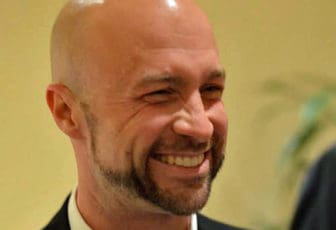COMMENTARY: Last week, a Virginia mayor used WWII Japanese-American concentration camps as an argument against taking Syrian refugees. Then Donald Trump said as president he would implement a database of all U.S. Muslims, regardless of their involvement in any crime.

Courtesy photo
Bill McCamley
When terrorists threaten us, we should worry about security. But we cannot let hysteria lead us down the road to oppression, and the actions above show why.
In 1942, President Roosevelt had 100,000 Japanese-Americans removed from their homes and placed in concentration camps. Two-thirds were American citizens, and no evidence was found that any were spies for the Japanese government. Many even went and fought in Europe despite this treatment. One of their units, the 442nd regimental combat team, is the most decorated unit in U.S. military history.
People were taken from their homes and families merely because of their names and facial features. This was wrong, and Ronald Reagan expressed regret for the atrocity in 1988 with the Civil Liberties Act. It gave each camp survivor $20,000 and apologized for “race prejudice, war hysteria, and a failure of political leadership.”
The history of government lists is just as bad. After WWI, over 10,000 people were arrested for being “communists” amid fear of a radical uprising. When nothing happened, a judge ceased the action, saying government officials acted like “a mob.” In the ’50s and ’60s, the FBI had a list of civil-rights leaders and used it to bug their personal homes. Targets included Martin Luther King, who was smeared by the government with letters describing recordings of his sex life.
Of course, the worst example is Nazi Germany. Lists of people there led to tracking, badge identification (Jews had to wear a Star of David, homosexuals had to wear Pink Triangles, etc.), and eventually mass extermination.
Home of the Brave
Singling out a group based on nothing more than name, religion, or national origin is wrong. Even worse — when it happens, the terrorists win.
ISIS wants a war between Muslims and everyone else to trigger the apocalypse. The more a wedge is driven between Muslims and the rest of the world, the easier they find it to recruit people to their side. Statements like Trump’s only help them.
If you think you’re safe because you aren’t Muslim, remember Martin Niemoller, a Protestant minister who lived through Nazi Germany and described the strategy of oppression. “In Germany they came for the Communists, and I didn’t speak up because I wasn’t a Communist. Then they came for the Jews, and I didn’t speak up because I wasn’t a Jew. Then they came for the Catholics, and I didn’t speak up because I was a Protestant. Then they came for me — and by that time no one was left to speak up.”
We usually think of bravery in terms of individual events — a soldier jumping on a grenade or a black woman refusing to go to the back of the bus. But bravery can happen every day.
An old classmate of mine, Mathieu, lives in a Paris with his wife and kids in a neighborhood that was attacked. The day after, he went to give blood. The week after, he asked people to join him in going back to cafes and theatres. Through it all, he has encouraged tolerance and understanding, knowing that giving into anger would only give the attackers what they want.
We all need to be like Mathieu, but bravery is hard. Will we treat others with respect, even if they share a name with a violent lunatic? Can we ignore those who will prey on our fear for political gain? Will we fight the hysteria that terrorists are trying to instill in us?
The answer needs to be yes. We are Americans. Remember, we are the Home of the Brave.
McCamley, a Democrat, is the state representative for District 33.
